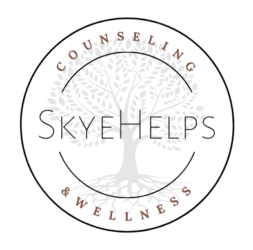Discover joy.
Request Counseling Appointment.

SkyeHelps Counseling & Wellness offers in-person and online counseling for individuals suffering from depression. If you are in crisis and need immediate attention, please call 988 or 911.
Depression Basics
For some, depression means feeling sad, but more often, it feels like moving through each day is like slogging through a swamp of molasses. For others, it might seem like everything that was once colorful is dull and gray – not bad, but not great. In some cases, all you want to do is sleep – or you would if you cared about sleep.
At SkyeHelps, we work with each client to identify the reasons for depression and identify the unique traits that define how you feel. Then we help you learn to cope. Coping looks different for each person affected by depression, but all clients have certain things in common that make it possible to manage.
Our approach is empathetic and kind, and we place great value on your individuality. We help you build and grow as a person, providing you with the tools to manage depression.
Depression Help
Depression is treatable. The first step is to reach out to us and ask for help. When you take that first step – and we know that for some people it’s a complicated thing to do – we will treat you with empathy and kindness. Your feelings are real. You’re not crazy, your feelings aren’t “dumb” or “stupid.” You never have to justify how you feel – to us or anyone else.
When you’re ready, we’ll be here to help you.
How SkyeHelps approaches depression
The first thing to know is that we listen to you. The second thing to know is that we believe every person has worth (even if they don’t believe it themselves). We treat every client with dignity and kindness. You are important.
The second thing to know is that we believe depression is usually a combination of your beliefs AND your chemistry. Most patients who suffer from long-term depressive symptoms will require a combination of therapeutic counseling AND medication management. We will work closely with your medical doctor to help find solutions that work for you.
The third thing to know is that we approach depression from a holistic model. We have seen patients respond most positively when we consider their beliefs, thoughts, feelings, and behaviors, as well as their nutrition, sleep hygiene, social support, and healthy living situations. We will consider the depressive symptoms from a lot of different angles.
Get a correct diagnosis.
The word “depression” describes a couple of different mental health conditions. Depending on the exact nature and severity of your symptoms, you might hear or read about things like Major Depressive Disorder, Minor Depressive Disorder, Bipolar Disorder, and Manic Depression. With this information in mind, one of the things we do during your consultation and intake interview is figure out which of these terms best describes what you’re experiencing.
Sometimes, people experience a deep sense of sadness from an early age. They receive a diagnosis and placed on psychotropic medications (“anti-depressants”) very early in life. Some children and teens are prescribed medication without a therapeutic relationship to help them learn about their feelings and have a safe space to talk.
A correct diagnosis, an ongoing therapeutic alliance with a trained clinician, a working relationship between you, your therapist, and your prescribing doctor, and a holistic approach to your life is key to depression treatment and healing.
Sometimes, it’s complicated.
Sometimes people experience depression along with other mental health issues. For instance, it’s common for people to experience a combination of depression and anxiety. In other cases, it might be accompanied by major life changes. Death, divorce, and loss are all associated with grief. And grief often looks like depression.
Trauma and post-traumatic stress disorder (PTSD) also contribute to feelings of sadness, hopelessness, and negativity. Consequently, your therapeutic process may begin by trying to sort out the complex jumble of feelings you’re experiencing.
In some cases, the way you feel can be a response to the way others treat you. Your life situation may be complicated and bring up many of the feelings associated with depression. If the people making life complicated happen to be loved ones, we might recommend family counseling or couples therapy.
Depression Resources
We encourage you to try and understand your circumstances to the best of your ability. After all, you know better what you feel and think than anyone else. Our job is to help you learn to think about and manage those feelings and thoughts in a way that helps you function more effectively and, eventually, thrive.
Depression Test. Do you suspect you might be dealing with depression, but you’re not certain? We recommend the Depression Test from Mental Health America. You can also call us for a free consultation at 706-864-5674.
The Diagnostic Statistical Manual (DSM). The DSM is a tool for psychiatrists, psychologists, counselors, social workers, and doctors. They use it to diagnose psychological and mental health conditions, and the manual lists very specific criteria that help practitioners understand and distinguish between various disorders. Many entries also list “rule-outs” that help professionals understand when someone does not have a particular condition or disorder. Depression is one of the conditions listed in the DSM, and if you want to know the signs, the DSM’s criteria are the most cited benchmark.

